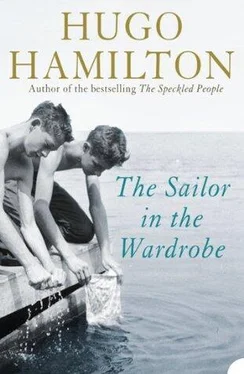We get on the bus to Norwich. From there we get the train to London, and soon we’ll be looking at movies, drinking in bars and going to nightclubs. We’re never looking back. We’re lashing down to London, speeding through the flat countryside where all the peas are grown. Machines harvesting. Trucks waiting to be loaded. We’re free and innocent while they are all still working. We will soon be dancing with women, while back at Ross Foods Ltd, they will be going insane with the sight of green peas all around them. They will be dreaming about peas and engines shaking without stopping all night. They’ll be complaining about the smell of socks and the rain coming through the holes in the roof. They’ll be dreaming about freedom. They’ll be dreaming about women in white coats and white underwear dancing around and throwing peas at each other. They’ll be dreaming about hips and Venus hills. Of peas and nipples and arms and legs. They’ll be dreaming of lying down across banks of peas with women taking off their white coats. Women whispering things that you cannot hear with the noise of the graders shaking all night. Peas rolling over soft skin. Peas running along breasts and peas rolling into belly buttons like roulette.
I’m out of the wardrobe now. Packer and I came to Berlin, arriving on the boat in Hamburg and coming down on the train late at night. We found jobs easily and I’ve started working in the store room of a publishing house. There are lots of new things happening here and it’s like living in the middle of a revolution, everything rushing forward into the future, like the traffic.
When you’re young, you can change your identity. You can escape from your family and change your name, leave your country, go to live in a new city and not tell anyone where you come from. You can disguise yourself like an actor and choose what to remember and what to forget. But there is always something that gives you away, some tell-tale part of you that cannot be hidden. It’s not just the obvious things like your accent, your language, your appearance. It’s the way you look at the world, your point of view. You can never disguise that because it shows up like ancient ruins on the landscape.
On my way to work every day I pass by the bombed-out ruins of the Kaiser Wilhelm Memorial Church, like an archaeological site left behind in the middle of the city. You can still see the bomb damage. The windows are hollow, without glass. An empty shell, left there deliberately with all its bullet holes as a reminder of war. Close to where I work, I pass by giant furniture stores where houses once stood. There’s one of those gaps in the street where a house disappeared and was never rebuilt, replaced instead by a children’s playground. I can hear children’s voices. Echoes of children. Even at night after dark, the ghosts of children, repairing history with sweets.
One day in a bookshop I came across some black and white pictures of the church from the time before the war when it was still intact. I realized that I was looking at the same church, but they had attached a spire that didn’t belong there. I could hardly recognize it, as if they had reconstructed the Rock of Cashel or rebuilt the deserted village in Achill. I thought I was mistaken and that the pictures belonged to some other city, until I read the caption underneath — Kurfürsten Damm, with a view of the Kaiser Wilhelm Memorial Church — taken in 1925. I was uneasy, looking back at this pre-war, pre-calamity time when nothing had happened yet and the worst was still to come. It was as if I could forecast the disaster of the Hitler years without being able to stop it. I didn’t trust myself and wanted to get back to the present. I walked out into the street, glad to see the Memorial Church once more with my own eyes, the same as it ever was, exactly as they had left it, a beautiful, bombed-out ruin, standing still in time.
I’ve got a place to live on a street called Sonnenallee, in Neukölln. There are lots of young Germans living in the apartment with me, so I begin to emphasize my Irishness, spending time with people who play Irish music in the bars at night. I’m learning to play the guitar and the tin whistle, even speaking broken German like Packer, to make sure that nobody mistakes me for a real German.
Maybe it’s a kind of homesickness, something I have inherited from my mother and my father. I’m always waiting for letters from home. One day I met an old woman standing by the rows of post-boxes in the hallway of the house on Sonnenallee, waiting for letters from far away, like myself. Some of the metal doors had been forced open. Others were full of advertising leaflets, like stuffed mouths. Through the small window in the post-box, I could see that there was no mail for me, but I went all the way down and opened the door with the key, just to be sure. I was on my way back up the stairs when the old woman spoke to me very politely, stepping into the light.
‘Excuse me,’ she said. ‘Are you the gentleman who plays the flute so beautifully?’
‘Yes,’ I said. I smiled, ready to talk about Ireland. But then the friendliness in her eyes disappeared. She looked me up and down, then came forward towards the banisters.
‘Listen here. If I ever hear that dreadful noise again, I’ll call the police.’
Later that evening, the Germans living in the apartment with me began to discuss the whole incident in a cloud of smoke. It was like a political meeting, with an ashtray and a candle at the centre of the round table. Some of them wanted to go straight down and teach her a lesson in tolerance. They planned a demonstration on the doorstep and suggested that I should perform something right under the old woman’s nose. Maybe I subconsciously thought about what she might have gone through during the war, the noise of the bombing every night, so I left it. I didn’t want music to be an aggression.
In the meantime, things have begun to move on. Packer is going back to Dublin to study law and I have been thinking about going to university in Berlin. I like the idea of studying German literature, which would be impossible in Dublin, because I can never live at home again. Somebody in the apartment suggested that I could take up German citizenship. With a German-born mother, it would be no problem. I could make life easy for myself.
There was another big discussion in the apartment after that. Please don’t become German, somebody started saying, with praying hands. You’ll have to think like a German, sleep like a German, even breathe like a German. Others thought it would make no real difference what passport you held, because your real identity would break through sooner or later. Everybody around the table was talking about how they would like to be Irish. Some of them had already been there and they spoke about the empty landscape, the standing stones, the smell of turf smoke. They asked me for tin whistle lessons. One of the girls said she would love to learn Irish. There was silence in the room as she disclosed her most secret wish, to belong to a people who had never harmed anyone. She wanted to belong to a minority, a people who were still oppressed and had not yet achieved their independence.
Then there were lots of letters for me. The old woman hanging around the post-boxes must have been jealous. She gave me a dirty look each time I opened my box, as if I had taken up correspondence with all kinds of people just to steal her post-luck away. All she got was the usual advertising leaflets which she then redistributed into the other post-boxes. Could it be, I wondered, that she was still waiting for letters that would never arrive, from the war? In the basement of the building I once found all these numbers written up in chalk on the wall, all the times she and other inhabitants spent sheltering from the bombing.
Читать дальше
Конец ознакомительного отрывка
Купить книгу












